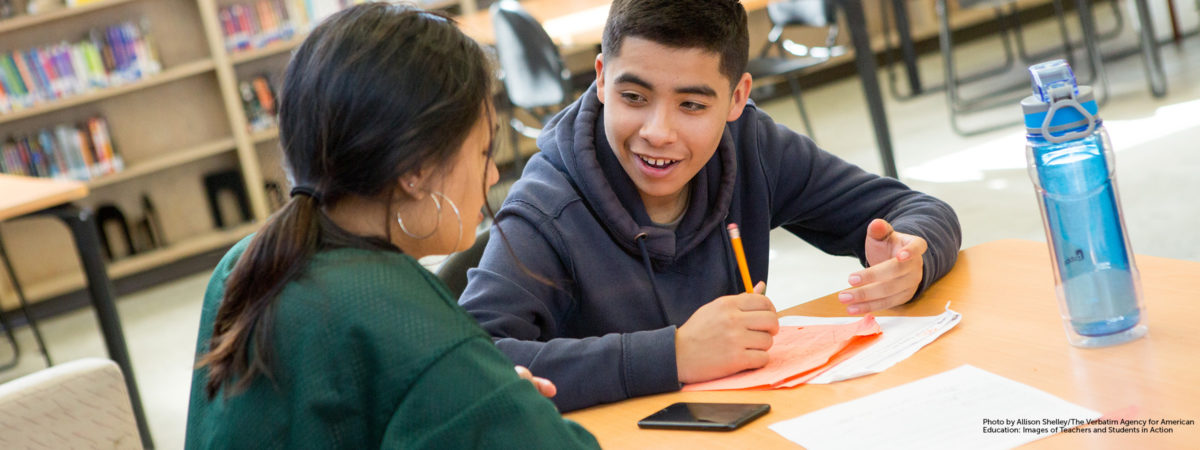
April 21, 2021 | By Babe Liberman
Adolescents are ready to move beyond simply stating ideas in writing, and are learning to craft their writing for specific audiences and purposes: to tell stories, build arguments, and make meaningful connections to their own culture, values, and identities. Unfortunately, not all students are given adequate opportunities or support necessary to thrive as writers. Research has shown that challenges in adolescent writing disproportionately impact Black and Latino students, and those experiencing poverty.
To respond to this urgent need, Digital Promise’s Center for Inclusive Innovation, with support from the Bill & Melinda Gates Foundation, is working with communities serving Black and Latino students, leveraging an equity-centered R&D approach to tackle pressing adolescent writing challenges, from teaching argumentative writing skills to developing student voice, through culturally relevant and affirming approaches to literacy. Based on their dedication to improving adolescent writing opportunities, strong community connections, and commitment to diversity, equity, and inclusion, we selected two district partners from the League of Innovative Schools: Socorro Independent School District, and Sunnyside Unified School District. Starting this month, teams of educators and community stakeholders from these districts will work with researchers, developers, and leaders from Digital Promise to understand their communities’ primary challenges in adolescent writing and prototype and trial solutions to address these challenges.
Read on below to meet the teams and learn about their adolescent literacy goals.
The Socorro school district, located along the U.S./Mexico border, serves a large proportion of emergent bilingual students; nearly 25 percent of students in the district are enrolled in bilingual and English learning programs. The Socorro team, including staff and community members affiliated with SSG Manuel R. Puentes Middle School and Ernesto Serna School, are hoping to increase authentic opportunities for students to write for purpose, and to build student confidence and motivation in writing, with a focus on those who are non-native English speakers.
“The only way to create change is to have people directly involved in the solution. By having our Black and Latino scholars, parents, educators, and the community directly involved in experiencing how to better their communication and writing skills, this is just a win-win for all involved. My hope is this will then inspire our group to continue to be the agent of change for others.” – “Monica Castro, Principal, Puentes Middle School
“Through this project, I believe that our community can gain a deeper appreciation of the value in understanding how students develop their language skills in both their native language and in the English language such that students can be truly fluent in English and in Spanish.” – Dr. Holly Fields, Professor, University of Texas El Paso
Sunnyside district and community members are interested in addressing key challenges, including poverty and the transience of the Tucson population, that impact their students; when kids move in and out of schools, they can lose crucial learning. The team, including staff and community members affiliated with Sunnyside High School and Desert View High School, are hoping to engage local nonprofits, higher education institutions, and grassroots organizations to provide students with opportunities and support to improve their writing.
“One of the biggest challenges our students face when it comes to writing is the starting point, finding the motivation and interest to produce a well-written piece of writing. Through this project, I hope our community will gain a common understanding of this challenge and others that our students face, as well as solutions and strategies to help overcome these challenges.” – Jon Schubel, Assistant Principal, Sunnyside High School
“Inclusive Innovation values the rich experiences and funds of knowledge of the local community. It is very important to give everyone a voice when it comes to education. I am excited about creating strategies with students, parents, and the community to better prepare students for their challenges beyond high school.” – Manny Leon, MESA Program Coordinator, University of Arizona
Want to learn more about Inclusive Innovation projects? Sign up below to stay informed about this project and for other opportunities to get involved with the Center for Inclusive Innovation.
Correction: This post was edited on Feb. 16, 2022, to accurately reflect the districts participating in this project.
By AJ Foster and Babe Liberman
By Josh Weisgrau and Teresa Solorzano